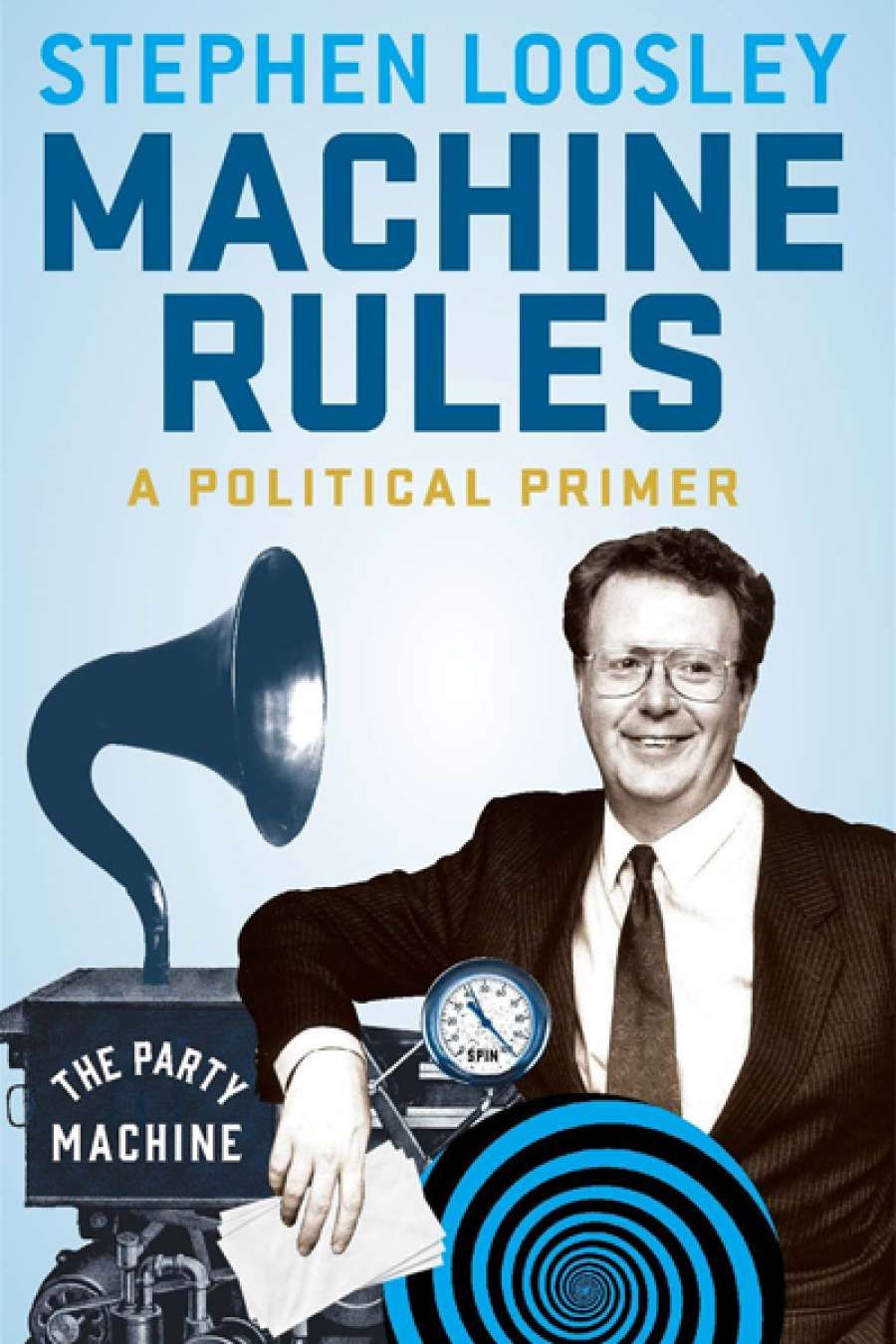
- Free Article: No
- Contents Category: Politics
- Custom Article Title: Joel Deane reviews 'Machine Rules' by Stephen Loosley
- Book 1 Title: Machine Rules
- Book 1 Subtitle: A Political Primer
- Book 1 Biblio: Melbourne University Press, $34.99 pb, 223 pp, 9780522867404
The Loosley formula is to commence a chapter with a joke or an anecdote, then offer a confusion of paragraphs as he makes a mad dash for the start of the next chapter. Here, for example, is a rundown of a Machine Rules chapter, taken at random. Loosley recalls attending an ALP national conference (presumably in the 1970s) with Bob Carr. At one point in proceedings Bill Hartley, a notorious figure from Victoria's Socialist Left faction, is called upon to speak. According to Loosley, Carr leans across and murmurs, 'And the asylum doors clang open.' Loosley then bangs on about Hartley's political shortcomings, passes over the federal intervention into the Victorian branch of the ALP, talks about factions in a vague way, has another shot at the Victorian Socialist Left, mentions in passing that the Australian Security Intelligence Organisation tried to recruit him while he was running the NSW right faction, talks some more about ALP national conferences, alludes to the fact that since the end of the Cold War the factions have been driven more by personality and power than by beliefs, then, at the end, puffs out his chest and derides the Greens as 'a collection box for the Far Left':
Tasmania represents the triumph of the Greens' approach to government: the state is now too close to an industrial museum surrounded by national parks, and with virtually everyone on some form of public assistance, courtesy of federal subsidies ... This would be the Australian future should the Greens ever win power in Canberra.
This is just sheer laziness. Instead of coming up with something substantial on the Socialist Left or the Greens, Loosley indulges in potshots ('asylum doors') and sloppy generalisations ('virtually everyone on some form of public assistance') about opponents far removed from his happy hunting ground in and around Sussex Street in Sydney. This is an author who wants to write a book without offending anyone of importance. As a consequence, he fails to write much of any significance, because nothing is at stake.
 Stephen Loosley
Stephen Loosley
Loosley pads out some chapters by indulging in drive-by ruminations about cinema (he likes quoting Stanley Kubrick's deadpan masterpiece Dr Strangelove) and literature (his three favourite Australian authors are David Malouf, Shirley Hazzard, and Christopher Koch), as well as confessing a liking for US Civil War history. Along the way, a few crumbs of interest fall from Loosley's table. A mildly unflattering Bronwyn Bishop story is told. The point is rightly made that Tony Abbott's chief of staff, Peta Credlin, was singled out for much undeserved criticism. A hagiography of the New South Wales right is constructed in which all those in Loosley's faction seem wise, worthy, and witty, while their foes on the left come across as dolts. A cavalcade of luminaries of the New South Wales right are adduced, from Graham Richardson to Paul Keating to John Ducker. Many of the stories feel well-worn and stultifying.
Loosley fails to address some of the big questions surrounding Australia's political system, such as fundraising reform and corruption. At one point, infuriatingly, he relates a story about a time he was called as a witness before the Independent Commission Against Corruption, without disclosing what matter he was being questioned about. All we need know, apparently, is that Loosley cracked a joke on the stand that all and sundry found amusing.
Perhaps the surest insight in Machine Rules is inadvertent. Loosley attends a book launch in Canberra. Launching the book, the late John Button extols the virtues of the tome and describes it as a major contribution to Australian political life. When he sits down next to Loosley, Button whispers. 'Not much of a book, is it?'


Comments powered by CComment